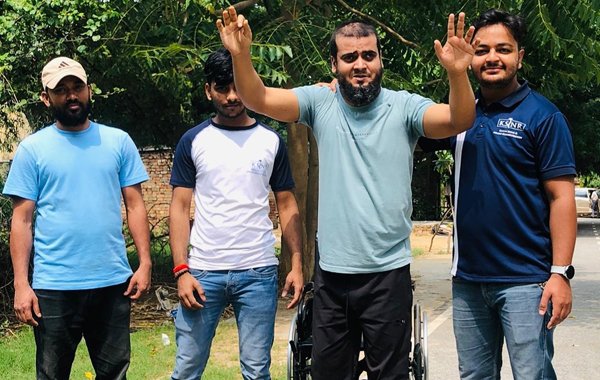A spinal cord injury is a life-altering event that can significantly impact not just the individual affected but also their entire support network. Among the key players in this network, family members often stand at the forefront, serving as the unwavering pillars of strength, support, and care. Their role is not just to provide assistance but also to provide emotional, physical and psychological support for the well-being and recovery of the individual.

The Immediate Impact after SCI
The moment an individual experiences an SCI, the entire family is impacted. Shock, disbelief, and emotional upheaval often accompany the initial news. In such tough time, family members become the first helping hands, offering comfort, reassurance, and a sense of stability to the survivor. Not only the comfort and reassurance but they also provide a sense of normalcy amidst chaos. In most of the cases family members are not aware of what is SCI and how to deal with it. So, along with being the helping hand for the survivor they also needs to gather knowledge about SCI and it’s complications.
Emotional Support and Encouragement
Emotional well-being plays a very important role in the recovery journey of SCI. Family members often act as emotional anchors, lending a listening ear, providing empathy, and fostering an environment of positivity. Definitely, the positivity is the reason that SCIs regain their health speedily. Additionally, the family members play a crucial role in preventing feelings of isolation and depression that can often accompany after such a life-altering event.
The consistent encouragement and motivation by these constant pillars contribute significantly to the injured individual’s mental resilience. Their unwavering belief in the person’s ability to adapt and overcome challenges becomes a driving force during the recovery process.
Physical Care and Assistance
Other than emotional support, family members also helps SCIs with proper physical assistance. They becomes caregiver for the survivors immediately after their injury. After SCI the survivors lose their mobility depending on their level of injury and therefore require significant physical support. The practical aspects of caregiving post-SCI are multifaceted and demanding. From aiding with daily activities to ensuring accessibility within the home, family members often take on the role of primary caregivers. Tasks like mobility assistance, personal care, helping in daily activities and managing medical needs become integral parts of their daily routine.
Adaptation and Environmental Adjustments
The family’s role extends beyond physical care; they are instrumental in creating an inclusive and supportive environment. Adapting the living space, altering routines, and making adjustments from installing ramps and handrails to rearranging furniture for easier mobility, these adaptations are essential for the injured person’s comfort and independence. This inclusivity not only aids the individual’s physical well-being but also fosters a sense of belonging and normalcy, crucial for mental health.
Learning and support
Families often need to undergo a learning process post-SCI, understanding the intricacies of the injury and how to support the individual in the best possible way. As, the impact and severity of the injury is different for different individuals. Also post-SCI the individuals faces a lot of challenges like immobility, bladder & bowel dysfunction and many more.
Moreover, family members may need to advocate for the injured person, navigating healthcare systems, rehabilitation programs. Their dedication and advocacy often ensure that the individual receives the best possible care and resources for their recovery.
Conclusion
In the journey of recovery after a spinal cord injury, the role of family stands unparalleled. Their unwavering support, dedication, and sacrifices contribute immensely to the individual’s rehabilitation and quality of life. Moreover, the demanding nature of caregiving can be emotionally and physically draining. Thus, respite care and self-care are vital for caregivers as well.

